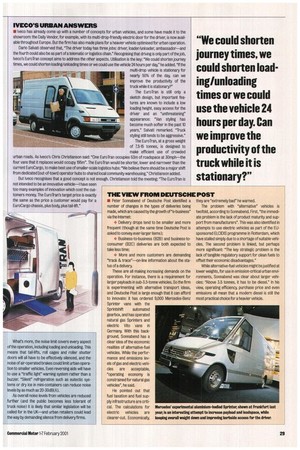THE VIEW FROM DEUTSCHE POST
Page 31

If you've noticed an error in this article please click here to report it so we can fix it.
II Peter Sonnabend of Deutsche Post identified a number of changes in the types of deliveries being made, which are caused by the growth of "e-business" via the Internet:
• Delivery drops tend to be smaller and more frequent (though at the same time Deutsche Post is asked to convey ever-larger items); • Business-to-business (B2B) and business-toconsumer (B2C) deliveries are both expected to take less time; • More and more customers are demanding "track & trace—on-line information about the status of a delivery, These are all making increasing demands on the operation. For instance, there is a requirement for larger payloads in sub-3.5-tonne vehicles. So the firm is experimenting with alternative transport ideas, and Deutsche Post is large enough that it can afford to innovate: it has ordered 9,000 Mercedes-Benz Sprinter vans with the Sprintshift automated gearbox, and has operated natural gas Sprinters and electric Vito vans in Germany. With this background, Sonnabend has a clear idea of the economic realities of alternative-fuel vehicles. While the performance and emissions levels of gas and electric vehicles are acceptable, "operating economy is constrained for natural gas vehicles", he said.
He pointed out that fuel taxation and fuel supply infrastructure are critical. The calculations for electric vehicles are clearer-cut. Economically, they are "extremely bad" he warned,
The problem with "alternative" vehicles is twofold, according to Sonnabend. First, "the immediate problem is the lack of product maturity and support from manufacturers". This was also identified in attempts to use electric vehicles as part of the EUsponsored ELCIDIS programme in Rotterdam, which have stalled simply due to a shortage of suitable vehicles. The second problem is linked, but perhaps more significant: "The key strategic problem is the lack of tangible regulatory support for clean fuels to offset their economic disadvantages."
While alternative-fuel vehicles might be justified at lower weights, for use in emission-critical urban environments, Sonnabend was clear about larger vehicles: "Above 3.5 tonnes, it has to be diesel." In his view, operating efficiency, purchase price and even emissions all mean that a modern diesel is still the most practical choice for a heavier vehicle.
































































































